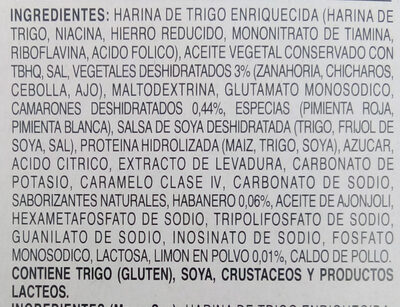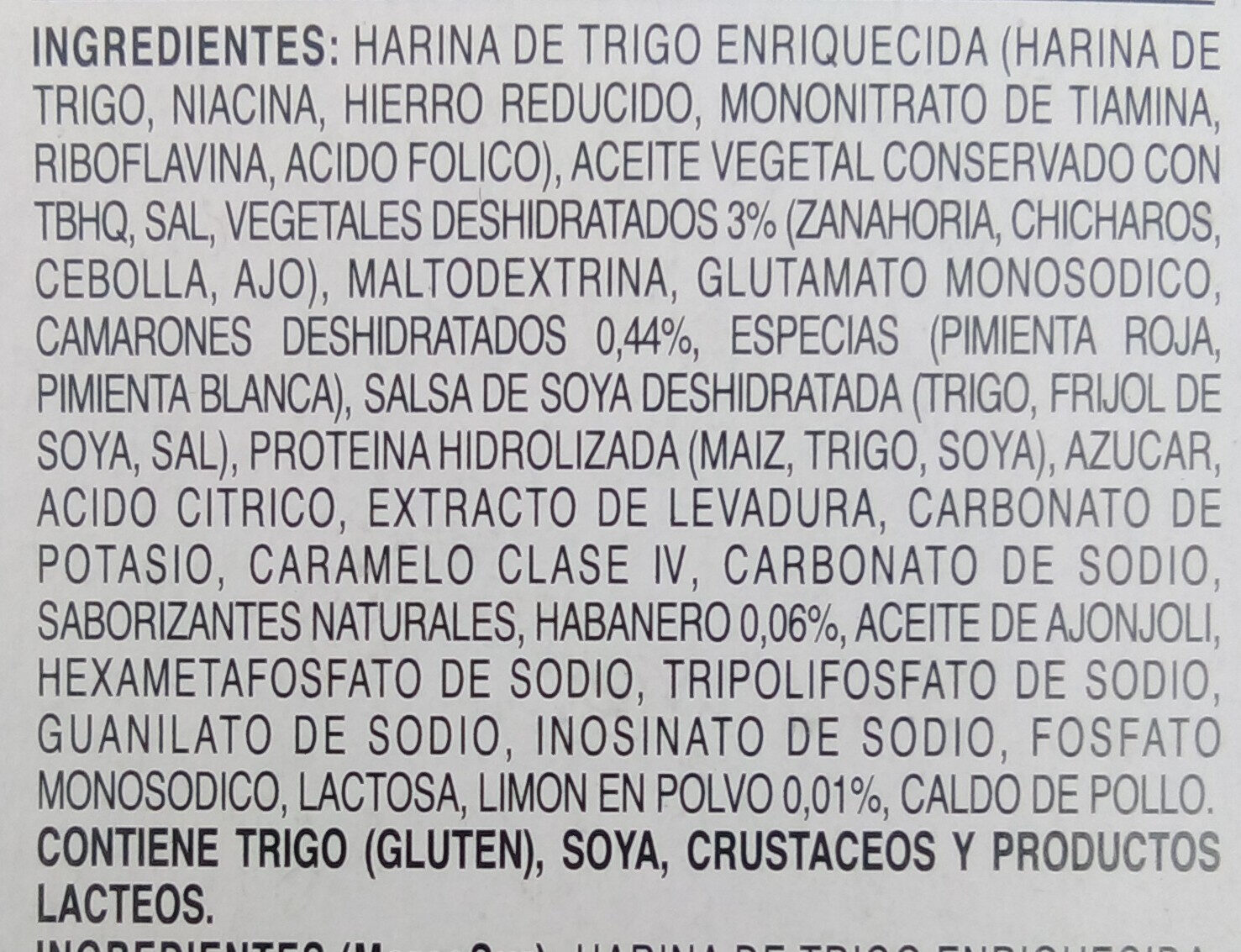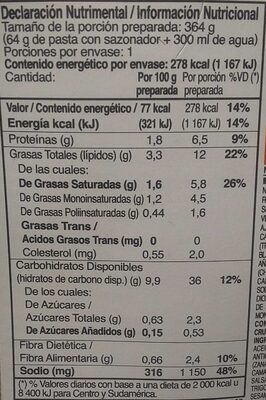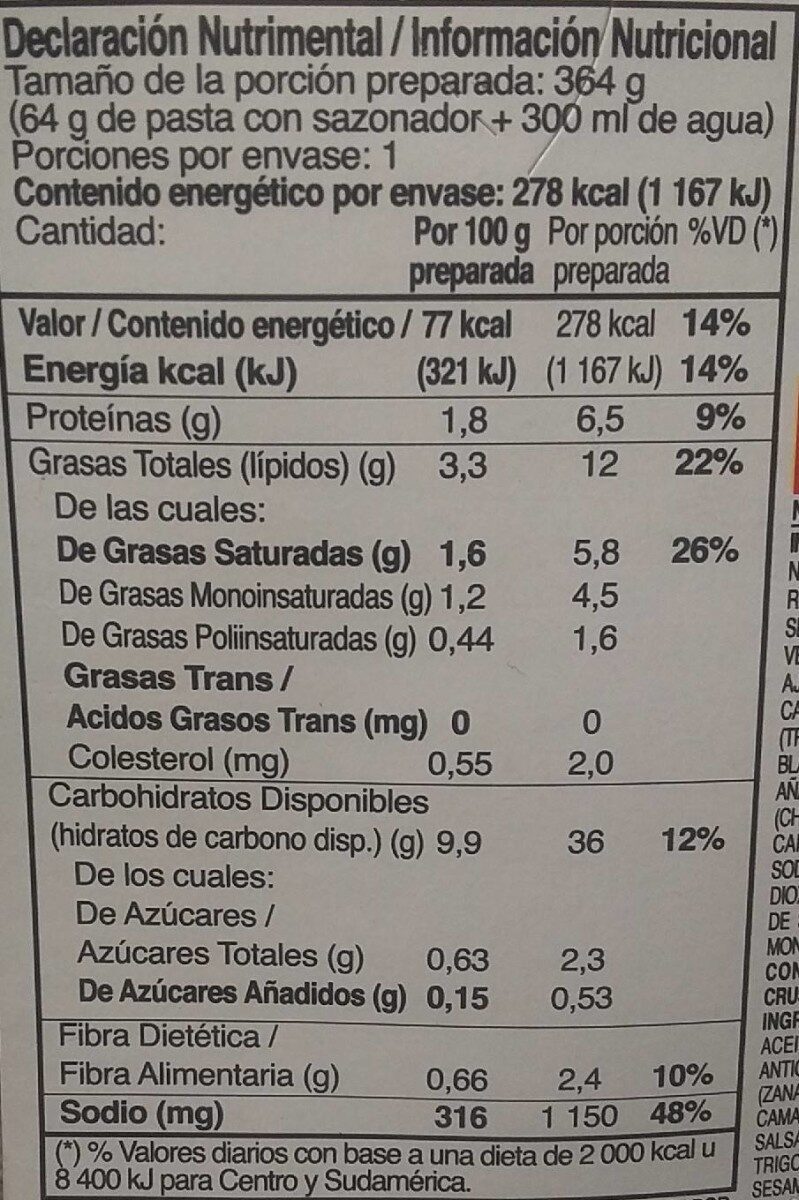Ajuda'ns a fer que la transparència alimentària sigui la norma!
Com a organització sense ànim de lucre, depenem de les vostres donacions per continuar informant els consumidors de tot el món sobre tot allò què mengen.
La revolució alimentària comença amb tu!
Pasta - Maruchan - 64 g
Pasta - Maruchan - 64 g
Aquesta pàgina del producte no està completa. Podeu ajudar a completar-la editant-la i afegint-hi més dades a partir de les fotos ja disponibles, o fent-ne més amb l'aplicació de androide o iPhone / iPad. Gràcies!
×
Codi de barres: 0041789001864 (EAN / EAN-13) 041789001864 (UPC / UPC-A)
Quantitat: 64 g
Empaquetament: Plàstic
Marques: Maruchan
Categories: Aliments i begudes amb base vegetal, Aliments amb base vegetal, Marisc, en:Fishes and their products, Productes per untar, Menjar preparat, Productes salats per untar, Productes secs, Plats de pasta, Pasta, Productes assecats per a ser rehidratats, Preparacions de peix, Fideus, Sopes, en:Instant noodles, en:Instant pasta, en:Anchovy paste
Etiquetes, certificacions, premis:
Sistema de Etiquetado Frontal de Alimentos y Bebidas, Exceso Grasas Saturadas
Origen dels ingredients: Estats Units d'Amèrica
Llocs de fabricació o processament: Irvine, California, EUA
Enllaç a la pàgina del producte en el lloc oficial del productor: http://www.maruchan.com.mx
Matching with your preferences
Salut
Ingredients
-
47 ingredients
Castellà: harina de trigo enriquecida (harina de trigo, niacina, hierro, reducido, mononitrato de tiamina, riboflavina, ácido fólico) aceite vegetal, canola, semilla de algodón, palma, conservado con TBQ, sal, vegetales deshidratados 3% (zanahorias, chicharos, cebolla, ajo) maltodextrina, glutamato monosódico, maíz, trigo, proteína de soya hidrolizados, camarones deshidratados 0.6%, chile habanero 0.07%, pimienta blanca, azúcar, ácido cítrico, salsa de soya deshidratada (trigo, frijol de soya, sal), extracto de levadura caramelo clase IV, carbonato de potasio, (mono, hexameta, trípoli) fosfato de sodio, aceite de ajonjolí, carbonato de sodio, inosinato disódico, guanilato disódico, limón en polvo 0.01%, caldo de pollo, lactosa, lecitina de soyaAl·lèrgens: en:Crustaceans, en:Gluten, en:Milk, en:Soybeans
Processament d'aliments
-
Aliments ultra processats
Elements que indiquen que el producte està al grup 4 - Aliments i begudes ultraprocessats:
- Additiu: E322 - Lecitines
- Additiu: E621 - Glutamat de monosodi
- Additiu: E627 - Guanilat de disodi
- Additiu: E631 - Inosinat de disodi
- Ingredient: Lactosa
- Ingredient: Maltodextrina
Els productes alimentaris es classifiquen en 4 grups segons el seu grau de processament:
- Aliments no processats o mínimament processats
- Ingredients culinaris processats
- Aliments processats
- Aliments ultra processats
La determinació del grup es fa en funció de la categoria del producte i dels ingredients que conté.
Additius
-
E322 - Lecitines
Lecithin: Lecithin -UK: , US: , from the Greek lekithos, "egg yolk"- is a generic term to designate any group of yellow-brownish fatty substances occurring in animal and plant tissues, which are amphiphilic – they attract both water and fatty substances -and so are both hydrophilic and lipophilic-, and are used for smoothing food textures, dissolving powders -emulsifying-, homogenizing liquid mixtures, and repelling sticking materials.Lecithins are mixtures of glycerophospholipids including phosphatidylcholine, phosphatidylethanolamine, phosphatidylinositol, phosphatidylserine, and phosphatidic acid.Lecithin was first isolated in 1845 by the French chemist and pharmacist Theodore Gobley. In 1850, he named the phosphatidylcholine lécithine. Gobley originally isolated lecithin from egg yolk—λέκιθος lekithos is "egg yolk" in Ancient Greek—and established the complete chemical formula of phosphatidylcholine in 1874; in between, he had demonstrated the presence of lecithin in a variety of biological matters, including venous blood, in human lungs, bile, human brain tissue, fish eggs, fish roe, and chicken and sheep brain. Lecithin can easily be extracted chemically using solvents such as hexane, ethanol, acetone, petroleum ether, benzene, etc., or extraction can be done mechanically. It is usually available from sources such as soybeans, eggs, milk, marine sources, rapeseed, cottonseed, and sunflower. It has low solubility in water, but is an excellent emulsifier. In aqueous solution, its phospholipids can form either liposomes, bilayer sheets, micelles, or lamellar structures, depending on hydration and temperature. This results in a type of surfactant that usually is classified as amphipathic. Lecithin is sold as a food additive and dietary supplement. In cooking, it is sometimes used as an emulsifier and to prevent sticking, for example in nonstick cooking spray.Origen: Wikipedia (Anglès)
-
E322i - Lecitina
Lecithin: Lecithin -UK: , US: , from the Greek lekithos, "egg yolk"- is a generic term to designate any group of yellow-brownish fatty substances occurring in animal and plant tissues, which are amphiphilic – they attract both water and fatty substances -and so are both hydrophilic and lipophilic-, and are used for smoothing food textures, dissolving powders -emulsifying-, homogenizing liquid mixtures, and repelling sticking materials.Lecithins are mixtures of glycerophospholipids including phosphatidylcholine, phosphatidylethanolamine, phosphatidylinositol, phosphatidylserine, and phosphatidic acid.Lecithin was first isolated in 1845 by the French chemist and pharmacist Theodore Gobley. In 1850, he named the phosphatidylcholine lécithine. Gobley originally isolated lecithin from egg yolk—λέκιθος lekithos is "egg yolk" in Ancient Greek—and established the complete chemical formula of phosphatidylcholine in 1874; in between, he had demonstrated the presence of lecithin in a variety of biological matters, including venous blood, in human lungs, bile, human brain tissue, fish eggs, fish roe, and chicken and sheep brain. Lecithin can easily be extracted chemically using solvents such as hexane, ethanol, acetone, petroleum ether, benzene, etc., or extraction can be done mechanically. It is usually available from sources such as soybeans, eggs, milk, marine sources, rapeseed, cottonseed, and sunflower. It has low solubility in water, but is an excellent emulsifier. In aqueous solution, its phospholipids can form either liposomes, bilayer sheets, micelles, or lamellar structures, depending on hydration and temperature. This results in a type of surfactant that usually is classified as amphipathic. Lecithin is sold as a food additive and dietary supplement. In cooking, it is sometimes used as an emulsifier and to prevent sticking, for example in nonstick cooking spray.Origen: Wikipedia (Anglès)
-
E330 - Acid citric
Citric acid: Citric acid is a weak organic acid that has the chemical formula C6H8O7. It occurs naturally in citrus fruits. In biochemistry, it is an intermediate in the citric acid cycle, which occurs in the metabolism of all aerobic organisms. More than a million tons of citric acid are manufactured every year. It is used widely as an acidifier, as a flavoring and chelating agent.A citrate is a derivative of citric acid; that is, the salts, esters, and the polyatomic anion found in solution. An example of the former, a salt is trisodium citrate; an ester is triethyl citrate. When part of a salt, the formula of the citrate ion is written as C6H5O3−7 or C3H5O-COO-3−3.Origen: Wikipedia (Anglès)
-
E621 - Glutamat de monosodi
Monosodium glutamate: Monosodium glutamate -MSG, also known as sodium glutamate- is the sodium salt of glutamic acid, one of the most abundant naturally occurring non-essential amino acids. Glutamic acid is found naturally in tomatoes, grapes, cheese, mushrooms and other foods.MSG is used in the food industry as a flavor enhancer with an umami taste that intensifies the meaty, savory flavor of food, as naturally occurring glutamate does in foods such as stews and meat soups. It was first prepared in 1908 by Japanese biochemist Kikunae Ikeda, who was trying to isolate and duplicate the savory taste of kombu, an edible seaweed used as a base for many Japanese soups. MSG as a flavor enhancer balances, blends, and rounds the perception of other tastes.The U.S. Food and Drug Administration has given MSG its generally recognized as safe -GRAS- designation. A popular belief is that large doses of MSG can cause headaches and other feelings of discomfort, known as "Chinese restaurant syndrome," but double-blind tests fail to find evidence of such a reaction. The European Union classifies it as a food additive permitted in certain foods and subject to quantitative limits. MSG has the HS code 29224220 and the E number E621.Origen: Wikipedia (Anglès)
-
E627 - Guanilat de disodi
Disodium guanylate: Disodium guanylate, also known as sodium 5'-guanylate and disodium 5'-guanylate, is a natural sodium salt of the flavor enhancing nucleotide guanosine monophosphate -GMP-. Disodium guanylate is a food additive with the E number E627. It is commonly used in conjunction with glutamic acid. As it is a fairly expensive additive, it is not used independently of glutamic acid; if disodium guanylate is present in a list of ingredients but MSG does not appear to be, it is likely that glutamic acid is provided as part of another ingredient such as a processed soy protein complex. It is often added to foods in conjunction with disodium inosinate; the combination is known as disodium 5'-ribonucleotides. Disodium guanylate is produced from dried seaweed and is often added to instant noodles, potato chips and other snacks, savory rice, tinned vegetables, cured meats, and packaged soup.Origen: Wikipedia (Anglès)
-
E631 - Inosinat de disodi
Disodium inosinate: Disodium inosinate -E631- is the disodium salt of inosinic acid with the chemical formula C10H11N4Na2O8P. It is used as a food additive and often found in instant noodles, potato chips, and a variety of other snacks. Although it can be obtained from bacterial fermentation of sugars, it is often commercially prepared from animal sources.Origen: Wikipedia (Anglès)
Anàlisi dels ingredients
-
Oli de palma
Ingredients que contenen oli de palma: en:Palm
-
No és vegà
Ingredients no vegans: Brou de pollastre, LactosaAlguns ingredients no s'han pogut reconèixer.
Necessitem la teva ajuda!
Podeu ajudar-nos a reconèixer més ingredients i analitzar millor la llista d'ingredients d'aquest producte i d'altres mitjançant:
- Editeu aquesta pàgina de producte per corregir les faltes d’ortografia de la llista d’ingredients i/o per eliminar els ingredients d’altres idiomes i frases que no estiguin relacionades amb els ingredients.
- Afegiu entrades, sinònims o traduccions noves a les nostres llistes multilingües d’ingredients, mètodes de processament d’ingredients i etiquetes.
Uniu-vos al canal #ingredients del nostre espai de discussió a Slack i/o apreneu sobre l'anàlisi dels ingredients en la nostra wiki, si voleu ajudar. Gràcies!
-
No és vegetarià
Ingredients no vegetarians: Brou de pollastreAlguns ingredients no s'han pogut reconèixer.
Necessitem la teva ajuda!
Podeu ajudar-nos a reconèixer més ingredients i analitzar millor la llista d'ingredients d'aquest producte i d'altres mitjançant:
- Editeu aquesta pàgina de producte per corregir les faltes d’ortografia de la llista d’ingredients i/o per eliminar els ingredients d’altres idiomes i frases que no estiguin relacionades amb els ingredients.
- Afegiu entrades, sinònims o traduccions noves a les nostres llistes multilingües d’ingredients, mètodes de processament d’ingredients i etiquetes.
Uniu-vos al canal #ingredients del nostre espai de discussió a Slack i/o apreneu sobre l'anàlisi dels ingredients en la nostra wiki, si voleu ajudar. Gràcies!
-
Detalls de l'anàlisi dels ingredients
Necessitem la teva ajuda!
Alguns ingredients no s'han pogut reconèixer.
Necessitem la teva ajuda!
Podeu ajudar-nos a reconèixer més ingredients i analitzar millor la llista d'ingredients d'aquest producte i d'altres mitjançant:
- Editeu aquesta pàgina de producte per corregir les faltes d’ortografia de la llista d’ingredients i/o per eliminar els ingredients d’altres idiomes i frases que no estiguin relacionades amb els ingredients.
- Afegiu entrades, sinònims o traduccions noves a les nostres llistes multilingües d’ingredients, mètodes de processament d’ingredients i etiquetes.
Uniu-vos al canal #ingredients del nostre espai de discussió a Slack i/o apreneu sobre l'anàlisi dels ingredients en la nostra wiki, si voleu ajudar. Gràcies!
es: trigo (harina de trigo, niacina, hierro, reducido, mononitrato de tiamina, riboflavina, ácido fólico), aceite vegetal, canola, semilla de algodón, palma, conservado con TBQ, sal, vegetales 3% (zanahorias, chicharos, cebolla, ajo), maltodextrina, glutamato monosódico, maíz, trigo, proteína de soya hidrolizados, camarones deshidratados 0.6%, chile habanero 0.07%, pimienta blanca, azúcar, ácido cítrico, salsa de soya (trigo, frijol de soya, sal), extracto de levadura caramelo clase IV, carbonato de potasio (mono, hexameta, trípoli), fosfato de sodio, aceite de ajonjolí, carbonato de sodio, inosinato disódico, guanilato disódico, limón 0.01%, caldo de pollo, lactosa, lecitina de soya- trigo -> en:wheat - vegan: yes - vegetarian: yes - ciqual_proxy_food_code: 9410 - percent_min: 3.33333333333333 - percent_max: 75.21
- harina de trigo -> en:wheat-flour - vegan: yes - vegetarian: yes - ciqual_proxy_food_code: 9410 - percent_min: 0.476190476190476 - percent_max: 75.21
- niacina -> en:e375 - vegan: maybe - vegetarian: maybe - percent_min: 0 - percent_max: 37.605
- hierro -> en:iron - percent_min: 0 - percent_max: 25.07
- reducido -> es:reducido - percent_min: 0 - percent_max: 18.8025
- mononitrato de tiamina -> en:thiamin-mononitrate - percent_min: 0 - percent_max: 15.042
- riboflavina -> en:e101 - vegan: maybe - vegetarian: yes - percent_min: 0 - percent_max: 12.535
- ácido fólico -> en:folic-acid - percent_min: 0 - percent_max: 10.7442857142857
- aceite vegetal -> en:vegetable-oil - vegan: yes - vegetarian: yes - from_palm_oil: maybe - percent_min: 3 - percent_max: 39.105
- canola -> en:canola - vegan: yes - vegetarian: yes - percent_min: 3 - percent_max: 27.07
- semilla de algodón -> en:cottonseed - vegan: yes - vegetarian: yes - percent_min: 3 - percent_max: 21.0525
- palma -> en:palm - vegan: yes - vegetarian: yes - from_palm_oil: yes - ciqual_food_code: 16129 - percent_min: 3 - percent_max: 17.442
- conservado con TBQ -> es:conservado-con-tbq - percent_min: 3 - percent_max: 15.035
- sal -> en:salt - vegan: yes - vegetarian: yes - ciqual_food_code: 11058 - percent_min: 3 - percent_max: 13.3157142857143
- vegetales -> en:vegetable - vegan: yes - vegetarian: yes - percent_min: 3 - percent: 3 - percent_max: 3
- zanahorias -> en:carrot - vegan: yes - vegetarian: yes - ciqual_food_code: 20009 - percent_min: 0.75 - percent_max: 3
- chicharos -> en:grass-pea - vegan: yes - vegetarian: yes - percent_min: 0 - percent_max: 1.5
- cebolla -> en:onion - vegan: yes - vegetarian: yes - ciqual_food_code: 20034 - percent_min: 0 - percent_max: 1
- ajo -> en:garlic - vegan: yes - vegetarian: yes - ciqual_food_code: 11000 - percent_min: 0 - percent_max: 0.75
- maltodextrina -> en:maltodextrin - vegan: yes - vegetarian: yes - percent_min: 0.6 - percent_max: 3
- glutamato monosódico -> en:e621 - vegan: yes - vegetarian: yes - percent_min: 0.6 - percent_max: 3
- maíz -> en:corn - vegan: yes - vegetarian: yes - ciqual_food_code: 9200 - percent_min: 0.6 - percent_max: 3
- trigo -> en:wheat - vegan: yes - vegetarian: yes - ciqual_proxy_food_code: 9410 - percent_min: 0.6 - percent_max: 3
- proteína de soya hidrolizados -> es:proteina-de-soya-hidrolizados - percent_min: 0.6 - percent_max: 3
- camarones deshidratados -> es:camarones-deshidratados - percent_min: 0.6 - percent: 0.6 - percent_max: 0.6
- chile habanero -> es:chile-habanero - percent_min: 0.07 - percent: 0.07 - percent_max: 0.07
- pimienta blanca -> en:white-pepper - vegan: yes - vegetarian: yes - ciqual_food_code: 11019 - percent_min: 0.01 - percent_max: 0.07
- azúcar -> en:sugar - vegan: yes - vegetarian: yes - ciqual_proxy_food_code: 31016 - percent_min: 0.01 - percent_max: 0.07
- ácido cítrico -> en:e330 - vegan: yes - vegetarian: yes - percent_min: 0.01 - percent_max: 0.07
- salsa de soya -> en:soy-sauce - vegan: maybe - vegetarian: maybe - ciqual_food_code: 11104 - percent_min: 0.01 - percent_max: 0.07
- trigo -> en:wheat - vegan: yes - vegetarian: yes - ciqual_proxy_food_code: 9410 - percent_min: 0 - percent_max: 0.07
- frijol de soya -> es:frijol-de-soya - percent_min: 0 - percent_max: 0.07
- sal -> en:salt - vegan: yes - vegetarian: yes - ciqual_food_code: 11058 - percent_min: 0 - percent_max: 0.07
- extracto de levadura caramelo clase IV -> es:extracto-de-levadura-caramelo-clase-iv - percent_min: 0.01 - percent_max: 0.07
- carbonato de potasio -> en:e501i - vegan: yes - vegetarian: yes - percent_min: 0.01 - percent_max: 0.07
- mono -> es:mono - percent_min: 0 - percent_max: 0.07
- hexameta -> es:hexameta - percent_min: 0 - percent_max: 0.07
- trípoli -> es:tripoli - percent_min: 0 - percent_max: 0.07
- fosfato de sodio -> en:e339 - vegan: yes - vegetarian: yes - percent_min: 0.01 - percent_max: 0.07
- aceite de ajonjolí -> en:sesame-oil - vegan: yes - vegetarian: yes - from_palm_oil: no - ciqual_food_code: 17400 - percent_min: 0.01 - percent_max: 0.07
- carbonato de sodio -> en:e500i - vegan: yes - vegetarian: yes - percent_min: 0.01 - percent_max: 0.07
- inosinato disódico -> en:e631 - vegan: maybe - vegetarian: maybe - percent_min: 0.01 - percent_max: 0.07
- guanilato disódico -> en:e627 - vegan: maybe - vegetarian: maybe - percent_min: 0.01 - percent_max: 0.07
- limón -> en:lemon - vegan: yes - vegetarian: yes - ciqual_proxy_food_code: 13009 - percent_min: 0.01 - percent: 0.01 - percent_max: 0.01
- caldo de pollo -> en:chicken-broth - vegan: no - vegetarian: no - ciqual_food_code: 11174 - percent_min: 0 - percent_max: 0.01
- lactosa -> en:lactose - vegan: no - vegetarian: yes - percent_min: 0 - percent_max: 0.01
- lecitina de soya -> en:soya-lecithin - vegan: yes - vegetarian: yes - ciqual_food_code: 42200 - percent_min: 0 - percent_max: 0.01
Nutrició
-
Poca qualitat nutricional
⚠ ️Atenció: no s'ha especificat la quantitat de fruites, verdures i fruits secs, no es té en compte la seva possible contribució positiva en la qualificació.Aquest producte no es considera una beguda per al càlcul de la Nutri-Score.
Punts positius: 0
- Proteïnes: 1 / 5 (valor: 1.79, valor arrodonit: 1.79)
- Fibra: 0 / 5 (valor: 0.659, valor arrodonit: 0.66)
- Fruites, verdures, fruits secs i olis de colza/nou/oliva: 0 / 5 (valor: 0, valor arrodonit: 0)
Punts negatius: 11
- Energia: 0 / 10 (valor: 321, valor arrodonit: 321)
- Sucres: 0 / 10 (valor: 0.632, valor arrodonit: 0.63)
- Greixos saturats: 1 / 10 (valor: 1.59, valor arrodonit: 1.6)
- Sodi: 10 / 10 (valor: 316000, valor arrodonit: 316000)
Els punts per proteïnes no es compten perquè els punts negatius són més o iguals a 11.
Puntuació nutricional: (11 - 0)
Nutri-Score:
-
Nivells de nutrients
-
Greix en Quantitat moderada (3.3%)
Què us cal saber- Un alt consum de greixos, especialment de greixos saturats, pot augmentar el colesterol, que augmenta el risc de patir malalties del cor.
Recomanació: Reduïu el consum de greixos i greixos saturats- Trieu productes amb menys greixos i greixos saturats.
-
Àcid gras saturat en Quantitat moderada (1.59%)
Què us cal saber- Un alt consum de greixos, especialment de greixos saturats, pot augmentar el colesterol, que augmenta el risc de patir malalties del cor.
Recomanació: Reduïu el consum de greixos i greixos saturats- Trieu productes amb menys greixos i greixos saturats.
-
Sucre en baixa quantitat (0.632%)
Què us cal saber- Un alt consum de sucre pot provocar augment de pes i càries dental. També augmenta el risc de patir diabetis tipus 2 i malalties cardiovasculars.
Recomanació: Limitau el consum de sucre i de begudes ensucrades- Les begudes ensucrades (com ara refrescos, begudes de fruites i sucs i nèctars de fruites) s'han de limitar tant com sigui possible (no més d'1 got al dia).
- Triau productes amb menor contingut de sucre i reduïu el consum de productes amb sucres afegits.
-
Sal comuna en alta quantitat (790%)
Què us cal saber- Un alt consum de sal (o sodi) pot provocar un augment de la pressió arterial, que pot augmentar el risc de patir malalties del cor i ictus.
- Moltes persones que tenen hipertensió no ho saben, ja que sovint no en tenen símptomes.
- La majoria de la gent consumeix massa sal (de 9 a 12 grams de mitjana al dia), al voltant del doble del nivell màxim d'ingesta recomanat.
Recomanació: Limitau la ingesta de sal i d'aliments rics en sal- Reduïu la sal que emprau quan cuinau, i no afegiu sal a taula.
- Limiteu el consum d'aperitius salats i trieu productes amb menor contingut de sal.
-
-
Informació nutricional
Informació nutricional Preparat
per 100 g/100 mlPreparat
per porció (364g)Comparat amb: en:Instant noodles Energia 321 kj
(76 kcal)1.167 kj
(278 kcal)Greix 3,3 g 12 g Àcid gras saturat 1,59 g 5,8 g Àcid gras monoinsaturat 1,24 g 4,5 g Àcid gras poliinsaturat 0,44 g 1,6 g Colesterol 549 mg 2.000 mg Hidrats de carboni 9,89 g 36 g Sucre 0,632 g 2,3 g Fiber 0,659 g 2,4 g Proteïna 1,79 g 6,5 g Sal comuna 790 g 2.875 g Fruits‚ vegetables‚ nuts and rapeseed‚ walnut and olive oils (estimate from ingredients list analysis) ? ?
Entorn
-
Eco-puntuació B - Impacte ambiental baix
El Eco-Score és una puntuació experimental que resumeix els impactes ambientals dels productes alimentaris.→ L'Eco-Score es va desenvolupar inicialment a França i s'està ampliant per a altres països europeus. La fórmula Eco-Score està subjecta a canvis, ja que es millora periòdicament per fer-la més precisa i més adequada per a cada país.Anàlisi del cicle de vida
-
Impacte mitjà dels productes de la mateixa categoria: A (Score: 82/100)
Categoria: Asian noodles, flavoured, dehydrated
Categoria: Asian noodles, flavoured, dehydrated
- Puntuació ambiental PEF ( petjada ambiental de l'aliment ): 0.26 (com més baixa sigui la puntuació, menor serà l'impacte)
- incloent l'impacte sobre el canvi climàtic: 1.67 kg CO₂ eq/kg del producte
Etapa Impacte Agricultura
65.5 %Processament
20.6 %Empaquetament
8.7 %Transport
3.5 %Distribució
1.8 %Consum
0.0 %
Bonificacions i punts negatius
-
Orígens dels ingredients amb impacte mitjà
Bonificació: +1
Política ambiental: +1
Transport: 0
Origen del producte i / o dels seus ingredients % d'ingredients Impacte Estats Units d'Amèrica 100 %Mitjà
-
Ingredients que amenacen les espècies
Punts negatius: -10
Conté oli de palma
Els boscos tropicals d'Àsia, Àfrica i Amèrica Llatina es destrueixen per crear i ampliar les plantacions de palmera d'oli. La desforestació contribueix al canvi climàtic, i posa en perill espècies com l'orangutan, l'elefant pigmeu i el rinoceront de Sumatra.
-
Embalatge d'impacte mitjà
Punts negatius: -10
Forma Material Reciclatge Impacte Unknown Plàstic Alt ⚠ ️ La informació sobre l'embalatge d'aquest producte no és prou precisa (formes i materials exactes de tots els components de l'embalatge).⚠ ️ Per a un càlcul més precís de l'Eco-Score, podeu modificar la pàgina del producte i afegir-los.
Si sou el fabricant d'aquest producte, podeu enviar-nos la informació amb la nostra plataforma gratuïta per a productors.
Eco-Score per a aquest producte
-
Impacte per a aquest producte: B (Score: 63/100)
Producte: Pasta - Maruchan - 64 g
Puntuació de l'anàlisi del cicle de vida: 82
Suma de bonificacions i punts negatius: -19
Puntuació final: 63/100
-
Petjada de carboni
-
Equivalent a conduir 0.9 km en un cotxe de gasolina
167 g de CO² per cada 100 g de producte
La xifra d'emissions de carboni prové de la base de dades Agribalyse d'ADEME, per a la categoria: Asian noodles, flavoured, dehydrated (Font: Base de dades ADEME Agribalyse)
Etapa Impacte Agricultura
61.0 %Processament
14.9 %Empaquetament
16.3 %Transport
6.8 %Distribució
1.0 %Consum
0.0 %
Empaquetament
-
Embalatge d'impacte mitjà
-
Peces d'embalatge
(Plàstic)
-
Materials d'embalatge
Material % Pes de l'embalatge Pes de l'embalatge per 100 g de producte Plàstic
-
Transport
-
Orígens dels ingredients
Orígens dels ingredients amb impacte mitjà
Origen del producte i / o dels seus ingredients % d'ingredients Impacte Estats Units d'Amèrica 100 %Mitjà
Espècies amenaçades
-
Conté oli de palma
Fomenta la desforestació i amenaça espècies com l'orangutan
Els boscos tropicals d'Àsia, Àfrica i Amèrica Llatina es destrueixen per crear i ampliar les plantacions de palmera d'oli. La desforestació contribueix al canvi climàtic, i posa en perill espècies com l'orangutan, l'elefant pigmeu i el rinoceront de Sumatra.
Report a problem
-
Incomplete or incorrect information?
Category, labels, ingredients, allergens, nutritional information, photos etc.
If the information does not match the information on the packaging, please complete or correct it. Open Food Facts is a collaborative database, and every contribution is useful for all.
Fonts de dades
Producte afegit per elcoco
Última modificació de la pàgina del producte per 5m4u9.
La pàgina del producte, també editada per elcoco.4182d3a842087c42e649560cb61f1e4b, generaxiontech, inf, kiliweb, martini101, openfoodfacts-contributors, packbot, tacite, thaialagata, yuka.sY2b0xO6T85zoF3NwEKvlkpVU_HZvwv1LCfgxE6GxvfVJ5rCfYFr5aroDKs.











